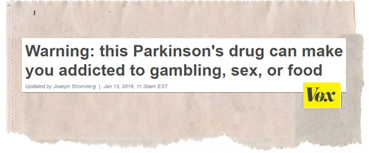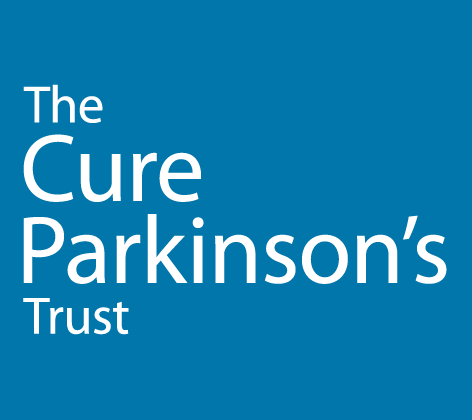HYPE?
Media portrayal:

HOPE?
Scientific interpretation:
The link between compulsive behaviours and dopamine treatment
Original article: Reports of pathological gambling, hypersexuality, and compulsive shopping associated with dopamine receptor agonist drugs, JAMA Int Med, Oct 20, 2014
The takeaway
Increasing evidence shows that dopamine receptor agonists (drugs that interact with dopamine receptors in the brain), which are used to treat Parkinson’s and other conditions, are associated with impulse control problems, such as compulsive gambling, shopping and hypersexuality.
Why is it important?
Dopamine receptor agonists are a common therapy for Parkinson’s, restless leg syndrome and other conditions—about 2.1 million prescriptions for dopamine receptor agonists were issued in the last part of 2012 alone. Compulsive behaviors can have severe negative consequences on the lives of patients and their families. These findings reinforce the importance of patient monitoring for these behaviours and underscores the need for clear communication to patients and care partners regarding risk.
%
IMPACT
- Novelty 20%
- Proximity 40%
- Deliverability 60%
Impact opinion
It is critical that all treatment decisions and risks are discussed with medical professionals.
Background
Dopamine is a chemical messenger that is responsible for reward responses, pleasure and movement, among other things. A lack of dopamine can cause problems with normal function; for example, in Parkinson’s disease, the death of dopamine-producing cells leads to loss of voluntary movement. One treatment option is dopamine agonists, which link up with dopamine receptors in the brain. Given dopamine’s association with the reward response, dopamine agonists may trigger compulsive behaviors.
The details
Scientists studied publicly available U.S. Food and Drug Administration data on serious adverse drug effects from 2003 to 2012. Overall, gambling was the most frequently reported problem, followed by hypersexuality, compulsive shopping and poriomania (the compulsion to aimlessly wander). The authors recommend improved patient education about the risks as well as prominent warnings.
Related work
A phase 3 clinical trial of a medication called N-acetylcysteine (NAC) on impulse control disorder induced by dopaminergic medications is soon to be underway in France. NAC is currently used to treat paracetamol overdose and mucous build-up but it is thought that it may also be able to reduce the ‘craving’ associated with behavioral addictions, potentially by reducing levels of alpha-synuclein.
To find out about other trials recruiting near you, take a look at Fox Trial Finder.
Where can I learn more?
Original article: Moore TJ, Glenmullen J, Mattison DR. Oct 20, 2014. Reports of pathological gambling, hypersexuality, and compulsive shopping associated with dopamine receptor agonist drugs. JAMA Int Med 174(12):1930–1933.



